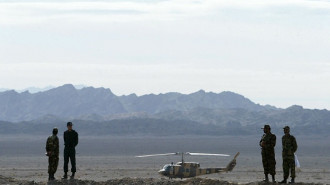Trump slams Iran ahead of presidency's first major US-Iran talks
The United States and Iran on Wednesday will have their highest-level interaction of Donald Trump's presidency, a day after the US leader delivered a blistering attack on the Islamic Republic and the landmark 2015 nuclear deal.
Amid strong signals Trump could walk away from the nuclear accord as early as next month, Secretary of State Rex Tillerson and Iranian Foreign Minister Mohammad Javad Zarif will attend a European Union-hosted meeting about the agreement at the United Nations.
The closed-door gathering is expected to be contentious, and the lead-up has seen Washington and Tehran trade increasingly harsh barbs.
A year ago, such a get-together would have been considered routine as nations strove to implement an agreement that curtailed Iran's nuclear activity in exchange for an end to various oil, trade and financial restrictions on the country. In the current environment of animus, however, it is anything but.
Trump used his UN General Assembly speech on Tuesday to launch a withering critique of Iran, saying its government "masks a corrupt dictatorship behind the false guise of a democracy" and ruthlessly represses its own people.
"It has turned a wealthy country with a rich history and culture into an economically depleted rogue state whose chief exports are violence, bloodshed and chaos," he said, repeating a litany of oft-spoken US complaints about Iran.
These include its antipathy to Israel, support for terrorism and Syrian President Bashar Assad, ballistic missile testing and its nuclear program.
"We cannot let a murderous regime continue these destabilising activities while building dangerous missiles," Trump said.
"And we cannot abide by an agreement if it provides cover for the eventual construction of a nuclear program.
The Iran deal was one of the worst and most one-sided transactions the United States has ever entered into. Frankly, that deal is an embarrassment to the United States."
The animosity is mutual.
Zarif, who had a friendly, collegial relationship with former Secretary of State John Kerry while they negotiated the nuclear deal, was quick to denounce Trump's speech.
He took to Twitter to offer a glimpse of what may be in store for future exchanges with U.S. officials, including perhaps with Tillerson on Wednesday.
"Trump's ignorant hate speech belongs in medieval times - not the 21st Century UN - unworthy of a reply," Zarif said on Twitter.
"Fake empathy for Iranians fools no one."
In comments broadcast shortly before Trump's speech, Iranian President Hassan Rouhani warned Trump that exiting the nuclear deal would "carry a high cost."
"No one would trust America again and there is no higher price to pay than this," Rouhani told NBC. "Which country would be willing to sit across the table from the United States of America and talk about international issues?"
Rouhani is set to deliver his own UN address on Wednesday, shortly before the nuclear meeting.
Trump has said repeatedly that he is inclined not to certify Iranian compliance after having twice found it compliant at earlier deadlines.
That could mean a return of US sanctions on Iran that were suspended under the agreement. Such action could lead Iran to then walk away from the deal or restart some nuclear activities it curtailed two years ago.
The rhetorical threats have worried the other countries in the agreement: Britain, China, France, Germany and Russia.
The Europeans, in particular, have expressed their disapproval of Trump's threats and talked about trying to lobby the US to abide by the accord.
Iran rejects that it has broken the agreement, and a UN report this month pointed to no Iranian violations.
Under US law, the president must certify to Congress every 90 days whether Iran is adhering to the agreement. If the president doesn't certify compliance, Congress has 60 days to decide whether to re-impose sanctions lifted under the agreement.
The next certification deadline is Oct. 15, and several officials and people close to the matter have described Trump as determined to "decertify" Iranian compliance with the nuclear deal at that point.
As he met Monday with French President Emmanuel Macron, Trump was asked if he would pull the US out of the agreement.
"You'll see very soon," Trump said.

![Palestinians mourned the victims of an Israeli strike on Deir al-Balah [Getty]](/sites/default/files/styles/image_684x385/public/2024-11/GettyImages-2182362043.jpg?h=199d8c1f&itok=xSHZFbmc)


![The law could be enforced against teachers without prior notice [Getty]](/sites/default/files/styles/image_684x385/public/2178740715.jpeg?h=a5f2f23a&itok=hnqrCS4x)
 Follow the Middle East's top stories in English at The New Arab on Google News
Follow the Middle East's top stories in English at The New Arab on Google News
![Fakhrizadeh [AFP] Fakhrizadeh [AFP]](/sites/default/files/styles/image_330x185/public/media/images/774C39F7-8F7A-4D67-B998-27D102FCB4A7.png?h=d1cb525d&itok=j9eGvunV)

